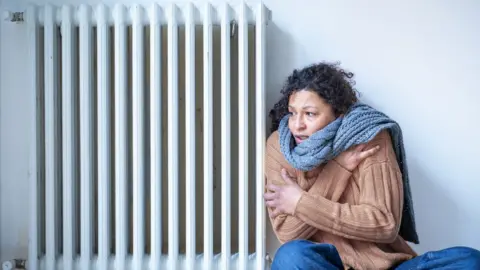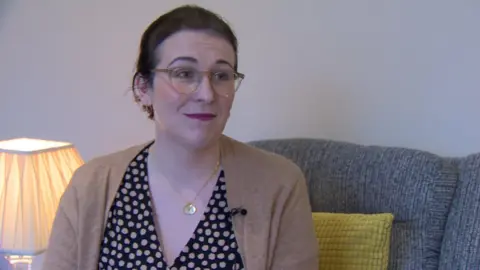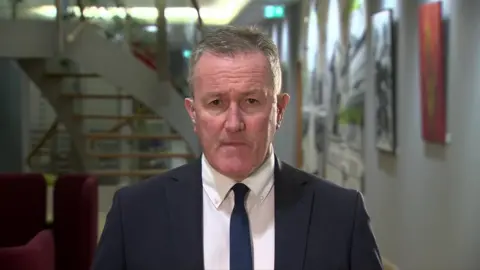Cost of living: Warning of 'hidden pandemic' of rising bills
 Getty Images
Getty ImagesNorthern Ireland is facing a "hidden pandemic" of people who cannot afford to heat or eat, an academic has warned.
In recent months there have been concerns about rising energy prices and inflation which have squeezed living costs.
Ulster University lecturer Dr Ciara Fitzpatrick said she had been inundated by people crying out for support.
"This is a hidden pandemic, everybody is going through such a hard time," she said.
Dr Fitzpatrick said she was frustrated the issue was not a bigger "political priority in Northern Ireland" considering its affect on families and children.
"These are people who are going to be our future," she added.
Since the draft budget went out to consultation, Stormont has received an additional £300m that cannot be allocated due to the collapse of the devolved government in February.
Dr Fitzpatrick said: "At this crucial time when inflation is due to rise by 8% - how frustrating is that?
"That money could be used to help people going through these hugely difficult times."
'It's freezing'
One of those who has seen a huge rise in her energy bills is Therese Kelly Dodds, a single mother from Ballycastle in County Antrim.
She now tops up her electricity meter every couple of days, as opposed to once a week.
"My whole house is electric. We're Economy Seven social housing which is supposed to be better, but we're finding it very difficult," she told BBC News NI.
"It's myself and my son who live here and we've turned off most of the heaters in the house.
"The bedroom heaters aren't switched on and it's freezing.
"We put more blankets on the bed and we sit here in the living room with these blankets to keep warm during the day, but it's a lot more expensive."
'How will people survive this?'
In the past, Ms Dodds said she spent between £20 to £30 a week on electricity, but it now costs at least double that amount.
Working part time as a single parent, she said the rising cost was not something she could keep up with.
"It's not just that that's going up, it's food, it's everything else, it's costing a lot of money," she said.
Ms Dodds said the increasing cost of living had affected her mental health, with constant worries and sleepless nights over how to pay her bills.
"You think you're doing the right thing going out to work, but [I] have nothing left at the end of the month," she added.
"I joked about it earlier about hearing the meter beeping in my sleep, I do hear it constantly.
"I'm just thinking to myself how is that possible to be going again?"
Ms Dodds is on universal credit and is hoping to receive a £200 grant towards her bills next week.
Speaking about that grant she said she was "very grateful, but I have other bills at the minute that are priority and I have to pay them".

"I don't think it'll last very long, between heating the house and buying a weekly food shop, it'll be gone," she said.
Ms Dodds said she would like to see more help from the government, but without an executive in place, no further funding can be allocated.
"The government and policymakers need to listen to us and provide things for people which are more cost effective and help people when they are really struggling," she said.
"We are already finding it extremely difficult and we're only a short time into this hike, I don't know how people are going to survive this."
Finance Minister Conor Murphy said a significant package of funding to help people with home heating had already been agreed and no extra funding could be allocated at the moment.

With regards to the £300m that has been given to Stormont, Mr Murphy said it would be taken into next year.
"We would have loved to have been able to take decisions to pre-allocate that as to where it needs to go, but we can't do any of that", he said.
"We can't set the three-year budget, all of that requires an executive in place.
"When we can't get one to meet, we can't take those decisions."
